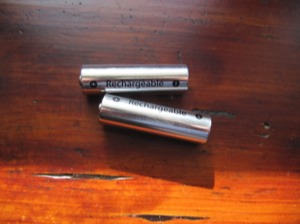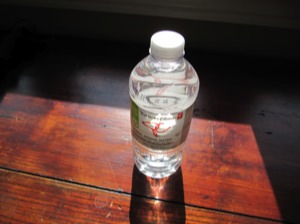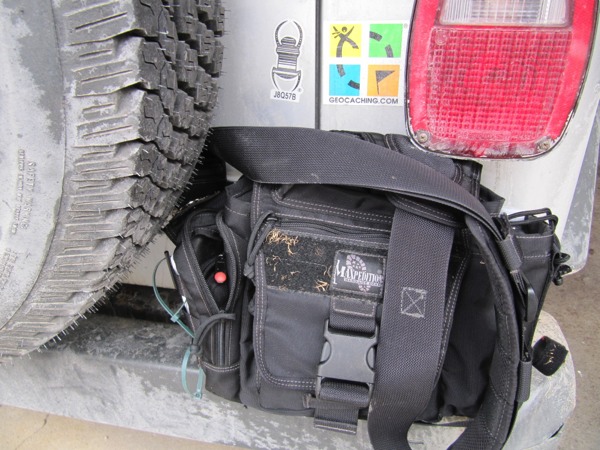
What I bring geocaching can be summed up in two words: too much.
I wish those two words were just: gps / pen. That's all I brought when I started geocaching. And of all the stuff you will bring those two items are still the most important and should be the only two items you bring when you're starting out. But as time and caches marched on I'd encounter situations where another tool proved to be useful. Consequently when I go caching all the tools that have proven useful are in the bag and the weight of the bag has increased proportionally. That said if I'm just going after a quick grab 'n go the bag will stay in the Jeep but otherwise it's with me.
Allow me to open said bag for your perusal where I'll detail what's inside and why. Oh and there's something outside I bring as well.
I wish those two words were just: gps / pen. That's all I brought when I started geocaching. And of all the stuff you will bring those two items are still the most important and should be the only two items you bring when you're starting out. But as time and caches marched on I'd encounter situations where another tool proved to be useful. Consequently when I go caching all the tools that have proven useful are in the bag and the weight of the bag has increased proportionally. That said if I'm just going after a quick grab 'n go the bag will stay in the Jeep but otherwise it's with me.
Allow me to open said bag for your perusal where I'll detail what's inside and why. Oh and there's something outside I bring as well.
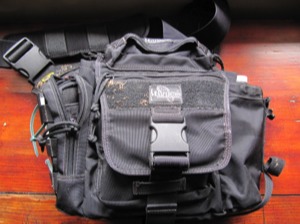
The Bag
A friend of mine told me that you can never have too many handbags. I don't have any handbags but bags of every other description - back, camera etc. - I have aplenty. So it came as somewhat of a surprise that I didn't have anything that really worked for caching. Local search proved fruitless. Then I found out about a company called Maxpedition. Seems they make bags for the police, military and the like. I ordered one (you can even specify if you carry the bag over your left or right shoulder) and have for the most part been pleased. It's bullet proof. Maybe not literally (and hopefully I won't have need of a bag that is) and accommodates all my stuff in an easy to access manner. There are loops and whatnot on the outside so you can clip more stuff onto it. I have but two gripes. One, there is no waterproof pocket. And two, there is no key clip. I live in fear of dropping the keys to the Jeep in some forest miles from home. I guess I should attach a spare key to the Jeep. Gee why didn't I think of that? As this bag suited me so well I got hold of both Maxpedition and Groundspeak to say they should work together and come up with a geocaching bag. Well they did. This bag. I'm still waiting for the credit ;-) Hopefully you'll have a bag at home that will work for a while until you figure out what you want in your geocaching bag.
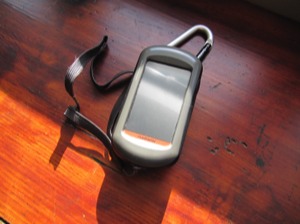
The Dedicated GPS - Garmin Oregon 450T
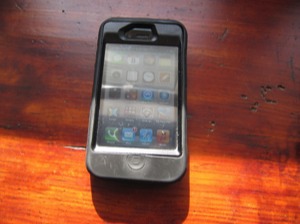
The Smart Phone
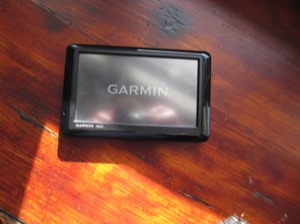
The Car GPS
When I first started I did a lot of research about GPS devices. The smart phone app wasn't out then. One thing everyone said was - don't buy a cheap GPS because you'll just be selling it and buying a more expensive one later. Did I heed their advice? Of course not. I wasn't going to plunk down $200+ on something when I didn't even know if I was going to like caching. While that logic still seems sound I really should have plunked.
These days you don't have to. If you have a smart phone there is an app that does everything the dedicated GPS device does and maybe more for only $10.
Don't have a smart phone? I have a friend, a waterloowarrier (her geocaching spelling), who used her car GPS for about three hundred finds before she bought a dedicated GPS (she doesn't own a smart phone).
There are advantages and disadvantages to each. With both the smart phone and the dedicated unit you have what's called 'paperless caching'. You'll soon see that there is a lot of information that needs to be recalled - the coordinates of the cache, the description of the cache, the hint if there is one, the logs of people who have tried to find it, and that's for each cache. Both the smart phone and dedicated GPS have these files inside which are in instantly recallable. The car GPS doesn't so you'll have to write this information down. Doable for sure but after a while it's drudgery.
The dedicated GPS, because it is so, will be more suited to caching. The screen will be more viewable than the other two in bright light. It will be more robust. Some say it will receive a weaker signal. It will have batteries that can be changed should they run out of juice. It's tough to charge a smart phone in the woods, ditto the car GPS.
The only real downside, apart from the cost, is that you will have to download the files of the caches onto your dedicated GPS before you go caching. This isn't really an issue because if you're going to be planning your caching afternoon anyway you'll be on the page where you download the file.
There is one other issue with dedicated GPS units, unless your unit comes with it you'll need to purchase a Canadian Topo Map in order to make it functional.
The other problem with the smart phone is that if there's no signal you're outta luck. I've seen this happen. Plus you need a data plan. From my experience you don't use a lot of data (depending on how judicious you are and how long you geocache of course) but data is what is needed.
That said one of the advantages of the smart phone is that there is nothing to download. Wherever you are the app will find caches near you. Over at some boring family gathering? Hmm maybe I'll check the old iPhone and see if there are any caches nearby. (There will be.)
OK so what do I use? I have all 3 devices but only because I bought them in the order they came out. Had I to do it today for sure if I had a smart phone I'd use it, number 1. For $10 you can't go wrong.
But even though I have all three my go-to device is still my Garmin Oregon 450T. I'm at a loss to explain why. It just is. Could be it's simply because I'm used to geocaching with it. Every now and then I will pull out the iPhone if I'm confused as to which direction to head. And there's nothing quite as annoying as when you have both the Garmin and the iPhone out and their respective arrows are pointing in opposite directions.
Waterloowarrier bought a Garmin eTrex20 for around $200 and is happy with it. My friend Nannya uses her iPhone and is happy with it.
If you are thinking of a dedicated GPS and want to shop locally, Adventure Guide has them. Don't not want to not promote local business and Adventure Guide has got me covered literally from head to toe (they not only know their stuff they will figure yours out for you too, I'm constantly amazed at the depth of their expertise) but I've been really happy with www.centralgps.ca when it comes to GPS units. I thought when I first got it that I might have an issue with my Oregon and contacted them. Their reply was simply, send it back. The warrier above used them too. I'm not affiliated but if you do end up doing business with them mention you heard about them on this site. Maybe down the road they'll start doing deals for future readers.
These days you don't have to. If you have a smart phone there is an app that does everything the dedicated GPS device does and maybe more for only $10.
Don't have a smart phone? I have a friend, a waterloowarrier (her geocaching spelling), who used her car GPS for about three hundred finds before she bought a dedicated GPS (she doesn't own a smart phone).
There are advantages and disadvantages to each. With both the smart phone and the dedicated unit you have what's called 'paperless caching'. You'll soon see that there is a lot of information that needs to be recalled - the coordinates of the cache, the description of the cache, the hint if there is one, the logs of people who have tried to find it, and that's for each cache. Both the smart phone and dedicated GPS have these files inside which are in instantly recallable. The car GPS doesn't so you'll have to write this information down. Doable for sure but after a while it's drudgery.
The dedicated GPS, because it is so, will be more suited to caching. The screen will be more viewable than the other two in bright light. It will be more robust. Some say it will receive a weaker signal. It will have batteries that can be changed should they run out of juice. It's tough to charge a smart phone in the woods, ditto the car GPS.
The only real downside, apart from the cost, is that you will have to download the files of the caches onto your dedicated GPS before you go caching. This isn't really an issue because if you're going to be planning your caching afternoon anyway you'll be on the page where you download the file.
There is one other issue with dedicated GPS units, unless your unit comes with it you'll need to purchase a Canadian Topo Map in order to make it functional.
The other problem with the smart phone is that if there's no signal you're outta luck. I've seen this happen. Plus you need a data plan. From my experience you don't use a lot of data (depending on how judicious you are and how long you geocache of course) but data is what is needed.
That said one of the advantages of the smart phone is that there is nothing to download. Wherever you are the app will find caches near you. Over at some boring family gathering? Hmm maybe I'll check the old iPhone and see if there are any caches nearby. (There will be.)
OK so what do I use? I have all 3 devices but only because I bought them in the order they came out. Had I to do it today for sure if I had a smart phone I'd use it, number 1. For $10 you can't go wrong.
But even though I have all three my go-to device is still my Garmin Oregon 450T. I'm at a loss to explain why. It just is. Could be it's simply because I'm used to geocaching with it. Every now and then I will pull out the iPhone if I'm confused as to which direction to head. And there's nothing quite as annoying as when you have both the Garmin and the iPhone out and their respective arrows are pointing in opposite directions.
Waterloowarrier bought a Garmin eTrex20 for around $200 and is happy with it. My friend Nannya uses her iPhone and is happy with it.
If you are thinking of a dedicated GPS and want to shop locally, Adventure Guide has them. Don't not want to not promote local business and Adventure Guide has got me covered literally from head to toe (they not only know their stuff they will figure yours out for you too, I'm constantly amazed at the depth of their expertise) but I've been really happy with www.centralgps.ca when it comes to GPS units. I thought when I first got it that I might have an issue with my Oregon and contacted them. Their reply was simply, send it back. The warrier above used them too. I'm not affiliated but if you do end up doing business with them mention you heard about them on this site. Maybe down the road they'll start doing deals for future readers.
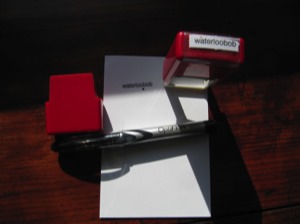
Something to Write With
It's as important as your GPS. You need something to write with. Don't go caching without it. A lot of caches are too small to contain a writing instrument. Some simply don't have one, period. And nothing, (actually not true, there are a few things), fries my geocaching derrière more than reading a log that says, "Found the cache. Forgot to bring a pen. Will sign later." Um, right. How do we know you actually found the cache and aren't just sitting at home at your computer logging find after find? Anyone who caches brings a pen. I bring two just in case one runs out or gets lost. A pen tip (hilarious pun if you didn't get it) - get a pen with a tiny tip. Reason being some of the smaller cache logs have tiny spaces in which to date and sign. The one in the photo is from Staples. It's called an OptiFLOW 1F but I've found something better. Sharpie makes a fine point marker that has one amazing feature - it is instantly smudge-proof. I's pretty much perfect for the task. Some cachers use a stamp. A friend gave me one as a gift and I'll use it when there is room. Pen! Don't leave home without one!!
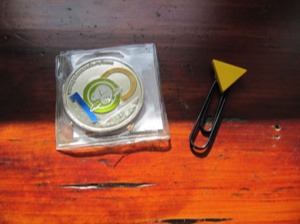
Tradsies
The convention is, if you take something from a cache, leave something of equal or greater value. Most of what you'll find in caches are tsotchkes of little to no worth. In other words gold in the eyes of kids. So bring some of your own trinkets. Some caches are trading caches and encourage people to bring say, trading cards. You'll read this in the cache description beforehand.
Now there is another item you may come across and this is a good time to bring it up. Some people put what are called Travel Bugs (TB's) in a cache. TB's are registered online and are placed in the cache in the hope that they'll be moved about, sometimes to a specific location, sometimes just to roam in the wild. A cacher told me that he and his wife once had a contest. They each planted a TB but in different caches. They wanted to see whose TB would first reach Hollywood. People who place TB's will be notified when someone finds it or moves it because the cacher who found it will have logged it online. When you read a cache description it will tell you if there is a TB inside the container so you can decide before you head out if you can or want to move it closer to its destination.
Some of the stories of TB's circling the globe and being returned to their owner are both wonderful and rare. It's a tough world out there for a TB, fraught with peril. So if you don't want to break some geocaching kid's heart, if you take a TB be sure to log it and put it in another cache.
Now there is another item you may come across and this is a good time to bring it up. Some people put what are called Travel Bugs (TB's) in a cache. TB's are registered online and are placed in the cache in the hope that they'll be moved about, sometimes to a specific location, sometimes just to roam in the wild. A cacher told me that he and his wife once had a contest. They each planted a TB but in different caches. They wanted to see whose TB would first reach Hollywood. People who place TB's will be notified when someone finds it or moves it because the cacher who found it will have logged it online. When you read a cache description it will tell you if there is a TB inside the container so you can decide before you head out if you can or want to move it closer to its destination.
Some of the stories of TB's circling the globe and being returned to their owner are both wonderful and rare. It's a tough world out there for a TB, fraught with peril. So if you don't want to break some geocaching kid's heart, if you take a TB be sure to log it and put it in another cache.
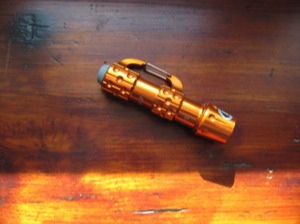
Flashlight
I once tried five times to locate a cache. I knew where it was but it wasn't until I was able to shine a light on it that I found it. Without going all CSI (why do they need flashlights in daylight?) a flashlight, this one is an LED, can come in handy when you need to peer down dark places - the kinds of places where cachers love to hide caches.
Now there is a group of cachers who like to cache at night. They are called 'crazy cachers'. No seriously, some caches are set up to be cached at night, they've got reflecting markers and such. Generally night cachers wear headlamps. Some of them seem to be normal in a 'he was such a quiet kid' kind of way;-)
I guess just about any cache could be searched at night but you have to ask yourself the question, how do I, wearing a headlamp and carrying a bag, and poking around in the dark, look to an interested observer? Hmm?
Now there is a group of cachers who like to cache at night. They are called 'crazy cachers'. No seriously, some caches are set up to be cached at night, they've got reflecting markers and such. Generally night cachers wear headlamps. Some of them seem to be normal in a 'he was such a quiet kid' kind of way;-)
I guess just about any cache could be searched at night but you have to ask yourself the question, how do I, wearing a headlamp and carrying a bag, and poking around in the dark, look to an interested observer? Hmm?
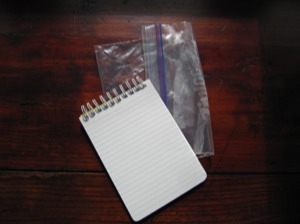
Baggies & Paper
Frequently you'll come across a cache whose logbook is either full or wet or in some otherwise state of disrepair usually because its baggy is a mess. It's tough for CO's, some who have caches numbering in the hundreds, to get around to performing routine maintenance on all their caches so helping out, by carrying a few baggies and some paper, isn't going to make the load any harder and will be appreciated by both CO's and other cachers. Just be sure to mention it in your log.
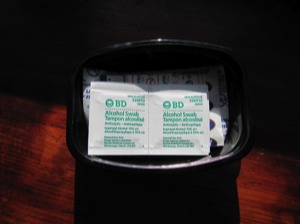
Medical Kit
You learn from your mistakes right? Or in my case you never do. Summer = Shorts as far as I'm concerned but it also makes bushwhacking and climbing over stuff an accident waiting to happen. There have been a couple of times where, well let's say it's a good thing there weren't sharks around. So now I carry some dressings and swabs, just in case. Of course I could just wear jeans but..
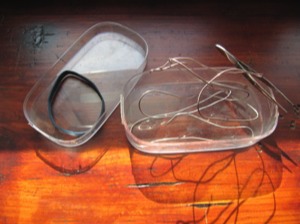
Tweezers & Wire
This probably seems unusual but I've used both a lot. Nano's in particular and even some micro's have tiny little logs all rolled up and jammed into the container. You often spend more time getting the logs out, signed and replaced than you do finding the cache itself. I've found tweezers ideal for extracting logs like this.
As for the wire, I checked to see what it's called but it's just called Stainless Steel Wire and you'll find it at any hardware store. It's the kind of wire you'd use to hang a heavy painting. The reason I carry some with me is that it can be folded into any shape and it will retain that shape. So with some caches I've fashioned the wire into a hook in order to pull the cache out. In one instance I used it to push a cache up and out. It won't pull up an ammo container but it's great for light work. Just be careful you don't poke your eye out with it as it's springy stuff.
As for the wire, I checked to see what it's called but it's just called Stainless Steel Wire and you'll find it at any hardware store. It's the kind of wire you'd use to hang a heavy painting. The reason I carry some with me is that it can be folded into any shape and it will retain that shape. So with some caches I've fashioned the wire into a hook in order to pull the cache out. In one instance I used it to push a cache up and out. It won't pull up an ammo container but it's great for light work. Just be careful you don't poke your eye out with it as it's springy stuff.
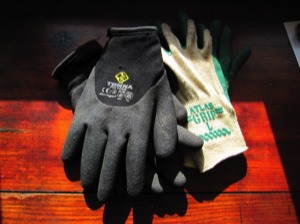
Gloves
I'm a late comer to gloves but now that I carry them I'll never not. You spend a lot of geocaching time rutting around, lifting up things. Sometimes the stuff is wet or is just not something you'd want to handle, it may be prickly or abrasive for example. Plus you get dirty. So gloves to the rescue.
In warmer weather I'll use plain old garden variety garden gloves. Light backing so they're not hot and with rubberized palm and fingers that are tailor made for rutting.
Friend Nannya saw another use for Costco's winter work gloves - as replacement for garden gloves when the temperature gets colder. These things are great but not for winter, they're not warm enough. They are perfect however for when garden gloves will be too cold.
As far as Winter goes the only thing I believe makes sense are waterproof mittens. Yup you'll have to take them off when you sign the log but until someone can direct me to a warm pair of gloves it's mittens for me.
In warmer weather I'll use plain old garden variety garden gloves. Light backing so they're not hot and with rubberized palm and fingers that are tailor made for rutting.
Friend Nannya saw another use for Costco's winter work gloves - as replacement for garden gloves when the temperature gets colder. These things are great but not for winter, they're not warm enough. They are perfect however for when garden gloves will be too cold.
As far as Winter goes the only thing I believe makes sense are waterproof mittens. Yup you'll have to take them off when you sign the log but until someone can direct me to a warm pair of gloves it's mittens for me.
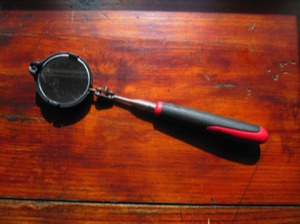
Extending Mirror
The latest addition to the bag so I can't attest as to how much use it will get. I know in some parts of the planet an extending mirror is more important than maybe even the GPS device. Some nasty things could be hiding under that Texas rock. A lot of people swear by having a mirror. Saves getting down on hands and knees for nothing. It has also given me a great idea for a cache. But for now… to be continued.
Update: Since getting this I've had two occasions to use it. The second paid for it as it revealed a tricky hide underneath a bridge. It's staying in 'the bag'.
Update: Since getting this I've had two occasions to use it. The second paid for it as it revealed a tricky hide underneath a bridge. It's staying in 'the bag'.
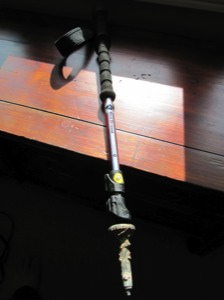
Collapsing Walking Stick
Chances are you can find a stick in the woods. I've done that lots. But Adventure Guide was having a sale on these things so I splurged and haven't regretted it. (You can find these anywhere. Lee Valley has one too.) This one is extendable and collapses so that I can mount it on top of 'the bag' with velcro when I don't need or want it. But when you're going down or climbing up a slippery and steep embankment, or when you're trying to maintain your balance to prevent getting a soaker because you're stepping on stones trying to cross a creek, becoming a tripod is much better way to go. But a stick works too.
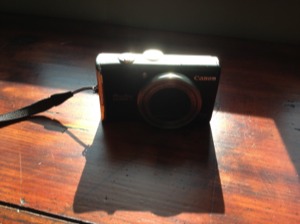
Camera
Yup I can and sometimes do use the camera on my iPhone but I love my little Canon point and shoot. Apart from taking wonderful photos it's a total non-brainer. Literally point and shoot but with options that make it a lot better than the camera in the iPhone. Like 12x optical zoom. There have been times when I can't see or read something far away. I'll zoom out to the max and shoot. Then I'm also able to zoom in on the photo I just took in the display. I've read signs I could barely see using this method. The other nice feature is that there are various settings for various shooting conditions, like snow. No more blue snow. I realize that all this can mostly be corrected after the fact but it's just so easy to pull it out of the side pocket in 'the bag' and fire away.
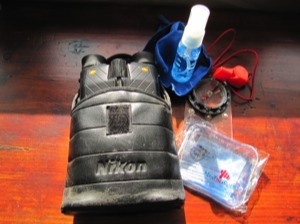
Miscellaneous Stuff
Just because 'the bag' isn't crammed full enough I used to bring along some miscellaneous stuff - ya know, just in case. But I've weaned myself off almost all of them, like...
Binoculars. A total waste of space but a carryover habit from my hiking days in the desert. Now I use my camera instead, see above.
Glass cleaner. I wear glasses. Think I may have used the cloth to get rid of rain drops. Once.
The item in the plastic bag is a chemical hand warmer. You never know, right? I think there's an expiry date.
Compass for when the GPS fails, my iPhone simultaneously fails and I have no idea where North is. Also a carryover from my hiking days.
Whistle. I forget what they used to call these. I guess it might be useful if the iPhone has no reception and I'm in trouble. Or if I happen across a basketball game in the woods and they need a ref.
Not seen - tissue of various descriptions, from paper towels to Kleenex. You can use your imagination for this one.
My latest addition is an extendable magnet bought in the auto section of Canadian Tire. Like all of this paraphernalia it's only handy when you need it and then it's invaluable.
Binoculars. A total waste of space but a carryover habit from my hiking days in the desert. Now I use my camera instead, see above.
Glass cleaner. I wear glasses. Think I may have used the cloth to get rid of rain drops. Once.
The item in the plastic bag is a chemical hand warmer. You never know, right? I think there's an expiry date.
Compass for when the GPS fails, my iPhone simultaneously fails and I have no idea where North is. Also a carryover from my hiking days.
Whistle. I forget what they used to call these. I guess it might be useful if the iPhone has no reception and I'm in trouble. Or if I happen across a basketball game in the woods and they need a ref.
Not seen - tissue of various descriptions, from paper towels to Kleenex. You can use your imagination for this one.
My latest addition is an extendable magnet bought in the auto section of Canadian Tire. Like all of this paraphernalia it's only handy when you need it and then it's invaluable.
